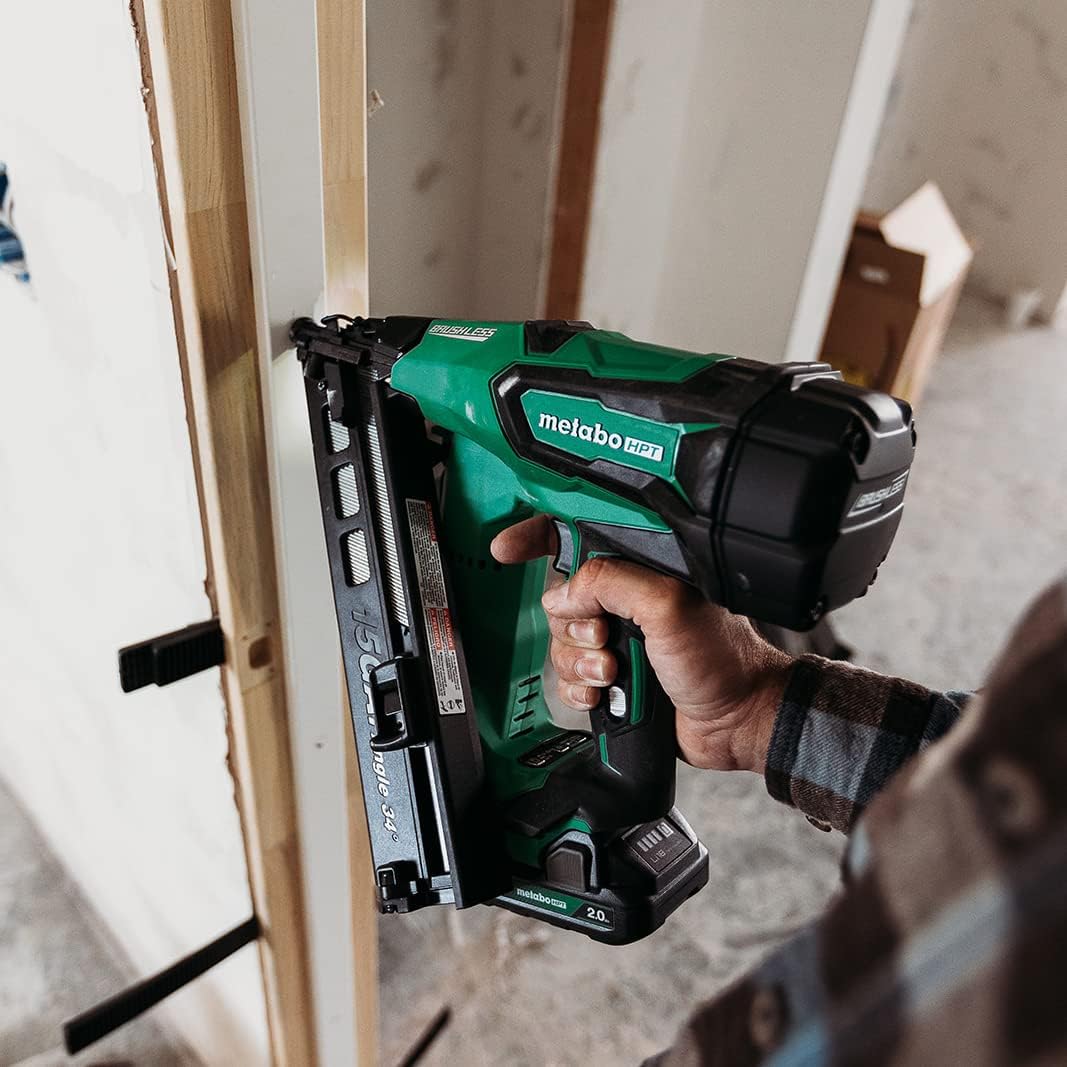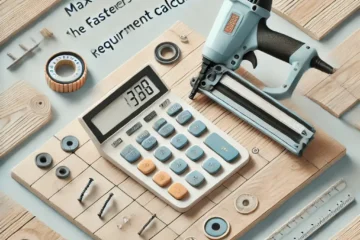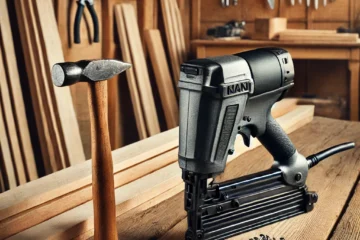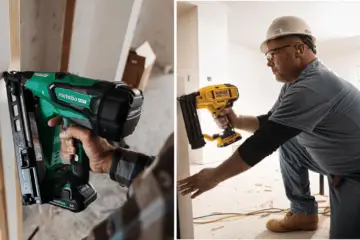If you’re tackling home improvement projects or entering the world of carpentry, a nail gun is one of the most valuable tools you can own. But how much does a nail gun cost? The answer depends on various factors such as the type, power source, brand, and features.
In this comprehensive guide, we’ll break down the different types of nail guns, price ranges, and factors that can affect your buying decision. Whether you’re a DIY enthusiast, a professional contractor, or just curious about nail guns, this guide will provide you with all the information you need.
Why Knowing Nail Gun Prices is Important?
Nail guns are versatile tools, capable of handling everything from light trim work to heavy framing. However, buying the wrong one for your needs or overpaying for features you don’t require can be frustrating.
Understanding the cost of nail guns and the reasons behind their price ranges ensures you make an informed choice that fits both your budget and your project needs.
What is a Nail Gun?
Before diving into the prices, it’s important to know exactly what a nail gun is. A nail gun (or nailer) is a tool that drives nails into wood or other materials. Instead of using a hammer to manually pound nails, nail guns use compressed air, electricity, or battery power to push the nails quickly and with precision.
Nail guns are used in various types of construction and home improvement projects, including framing, roofing, and finish work. They’re efficient, save time, and minimize the risk of injury associated with hammering.
Types of Nail Guns and Their Price Ranges
The price of a nail gun can vary widely depending on its type and power source. Below is a breakdown of the main categories:
1. Pneumatic Nail Guns
Price Range: $70 to $300
Best for: Heavy-duty projects such as framing, decking, or roofing.
Pneumatic nail guns are powered by compressed air, requiring an air compressor to function. These nailers are known for their power and reliability, making them a favorite among professionals. However, the need for an air compressor adds to the overall cost and bulk of your setup.
Example Prices:
- Entry-level models: $70 to $120
- Mid-range models: $120 to $200
- Professional-grade models: $200 to $300
Key Benefits:
- High power output
- Reliable performance for long-term use
- Perfect for professional contractors
2. Cordless (Battery-Powered) Nail Guns
Price Range: $150 to $400
Best for: DIY enthusiasts and professional carpenters needing portability.
Cordless nail guns have gained popularity due to their convenience. Unlike pneumatic models, they don’t need an air compressor. Instead, they are powered by rechargeable batteries, making them more portable and easier to handle. However, these models tend to be more expensive upfront.
Example Prices:
- Entry-level models: $150 to $200
- Mid-range models: $200 to $300
- High-end models: $300 to $400
Key Benefits:
- No need for an air compressor
- More portable and easier to maneuver
- Ideal for on-the-go projects
3. Electric Nail Guns
Price Range: $50 to $200
Best for Light-duty tasks like trim and molding work.
Electric nail guns come in both corded and cordless versions. They tend to be less powerful than pneumatic and battery-powered models, but they are much more affordable and suitable for lighter work. These nailers are perfect for small home improvement tasks but may struggle with heavy-duty jobs.
Example Prices:
- Entry-level models: $50 to $100
- Mid-range models: $100 to $150
- High-end models: $150 to $200
Key Benefits:
- Budget-friendly
- Easy to use for lighter projects
- No need for an air compressor or batteries
4. Brad Nailers vs. Finish Nailers
Brad nailers and finish nailers are two common types of nail guns used for lighter woodworking and trim work. Understanding their differences can help you make the right purchase.
Brad Nailers (18-gauge)
Price Range: $50 to $250
Best for delicate trim work, smaller woodworking projects, and baseboards. They shoot thinner nails (18-gauge) that leave small holes.
Finish Nailers (16-gauge)
Price Range: $80 to $300
Used for heavier trim work, such as crown molding and door frames, finish nailers shoot 16-gauge nails that are thicker than brad nails.
Factors That Influence Nail Gun Prices
When purchasing a nail gun, there are several factors to consider beyond just the initial price tag. These can affect the overall cost and your long-term satisfaction with the tool.
1. Power Source
Pneumatic nail guns tend to be cheaper upfront than cordless models, but you’ll also need to purchase an air compressor if you don’t already have one. Cordless models, while more expensive, offer convenience and portability.
2. Brand
Well-known brands such as DeWalt, Hitachi, and Paslode tend to have higher price points due to their reputation for quality and durability. However, budget-friendly brands like WEN or Campbell Hausfeld may still offer good performance for casual use.
3. Durability and Build Quality
Higher-end models often use better materials and feature enhanced durability, making them more suitable for long-term use. Investing in a high-quality tool might save you money in the long run by reducing the need for replacements or repairs.
4. Additional Features
Some nail guns come with added features such as depth adjustment, anti-jam mechanisms, or quick-change nosepieces. While these can drive up the price, they often provide more value by increasing efficiency and ease of use.
Personal Experience: Choosing the Right Nail Gun
From my own experience as a DIY enthusiast, I’ve found that price is not the only factor to consider when buying a nail gun. I purchased a pneumatic framing nailer for about $120, but after factoring in the air compressor (an additional $150), the total cost exceeded $250. Despite the upfront investment, the power and efficiency of the pneumatic system made it worth every penny, especially for framing and decking projects.
On the other hand, for smaller indoor projects, my $90 electric Brad nailer has been more than sufficient, saving me both time and effort without needing to deal with an air compressor or bulky setup.
Expert Insights: What Do Professionals Say?
To get an expert opinion, I reached out to a professional contractor, John Williams, who shared his thoughts:
“For heavy-duty projects, you can’t beat the power of a pneumatic nail gun. But if you’re doing smaller, detailed work like crown molding, a cordless brad nailer is your best bet for convenience and accuracy.”
Tips for Buying a Nail Gun
- Assess Your Needs: Are you working on light projects, or do you need a nail gun for framing and roofing? Matching the tool to the job will ensure you get the best value for your money.
- Consider Future Use: Will you use this nail gun for multiple projects, or is it a one-time purchase? Investing in a more versatile tool may be worth it.
- Don’t Forget Accessories: If you buy a pneumatic nail gun, factor in the cost of an air compressor. For cordless models, consider the cost of extra batteries.
Conclusion: How Much Should You Spend on a Nail Gun?
The price of a nail gun depends on several factors, including its type, power source, brand, and features. For light DIY tasks, an electric or entry-level cordless model priced between $50 and $150 will usually suffice. However, for heavy-duty or professional projects, investing in a pneumatic or high-end cordless model priced from $150 to $400 can offer better performance and longevity.
When purchasing a nail gun, balance your budget with your project needs and consider future uses. With the right choice, a nail gun will save you time and effort on any project, making it a valuable tool for both DIY enthusiasts and professionals.
Frequently Asked Questions (FAQs)
How much is a nail gun on average?
On average, nail guns range from $50 to $400, depending on the type, power source, and brand.
Are expensive nail guns worth the cost?
Expensive nail guns often offer better build quality, enhanced features, and greater durability, making them worth the investment for frequent users or professionals.
Can I rent a nail gun instead of buying one?
Yes, many hardware stores offer nail gun rentals, usually at a rate of $20 to $40 per day, which can be a cost-effective option for one time projects.




